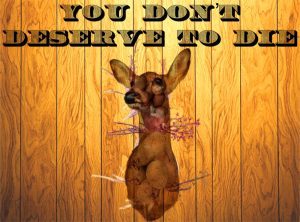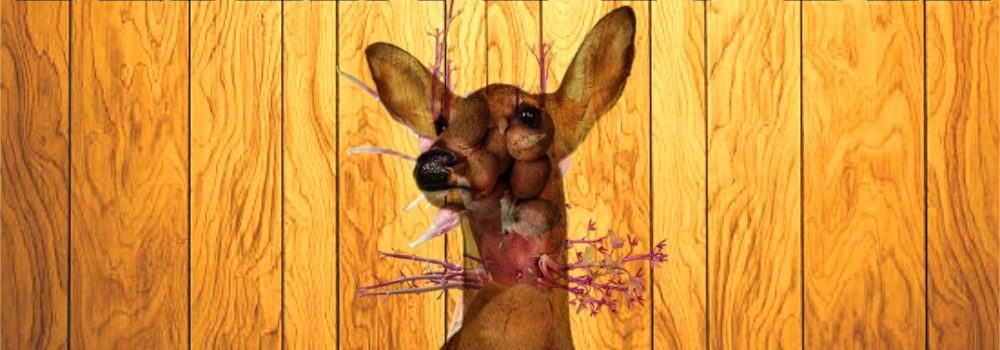Art Kopischke’s You Don’t Deserve to Die – which will receive a reading next Saturday in Green Bay as part of the World Premiere Wisconsin festival of new plays – features a singing deer whose repertoire includes both Dido’s lament from the opera Dido and Aeneas and Kate Bush songs.
Not that the five residents we meet from Koepsell House – a vegan co-op on a small college campus – are paying the deer much mind. Or thinking very hard about why a rabbit is asking for potato chips, aggressive chickens are attacking humans, or potatoes resemble “little demons.”
Freddie, Lily, D, Cam, and Debra got more important things on their mind.
Like planning the upcoming Earth Day party. Finishing senior projects. Debating whether they should stop buying bananas, chocolate, and almond milk, given the environmental and human cost of producing them. And wondering whether it’s OK for a vegan co-op – only one of whose members is actually vegan – to purchase and consume high-quality, locally sourced meat.
“The potatoes, bunny, deer, and chickens are haunting the minds of the co-op residents,” Kopischke (they/them) said to me during a recent phone conversation. But those humans are only paying intermittent attention, even as they know deep down that the planet earth is spinning out of control.


When Good Intentions Aren’t Enough
It’s not that Koepsell’s denizens don’t care.
The 28-year-old Kopischke was in a vegan co-op back in college; their script suggests an innate understanding of people like the play’s characters. At the same time, Kopischke now has enough distance from college to see these characters’ flaws, while nevertheless retaining enough affection for such characters to treat them kindly.
The result is a play in which the humor and farce are rarely hard-edged or sardonic.
In their narrow focus on whether their individual lifestyle choices are making a difference in saving the world, Kopischke’s characters may sometimes miss the forest for the trees.
But at least they’re earnestly looking for answers, even as they often find themselves wondering why they bother.
“One cannot get bogged down in the sense that nothing one does matters,” Kopischke insisted. “That’s a dangerous way of thinking. There’s so much that’s worth fighting for. Part of trying to be a good person is being aware of that, and the complexities involved with that.
“This play is exploring how confining and isolating it can be to stay pure. Trying to be a good person is made that much harder when we don’t confront the prospect that even our best intentions can have a catastrophic effect. So many of out attempts to do good backfire.”
Kopischke readily admits that their thinking hadn’t yet evolved to this point when they were still in college, living in a co-op like the one depicted in their play.
That double vision – allowing Kopischke to remember back to who they once were while taking stock of where they now are – lends a naive sweetness and poignancy to many of the conversations between the play’s characters, each of whom is trying to solve seemingly insurmountable problems about how to be in the world,
“All this ‘trying’ is just making everything worse,” Lily laments at one point, while castigating herself as a “fraud.”
My “veganism is just sucking the water out of California or supporting unethical labor practices and gentrifying food,” Lily continues. “And most vegetables I eat aren’t even produced without animal byproduct.”
The Animals All Around Us
Enter that singing deer, who’ll return at play’s end in a coup de theatre I can’t reveal but you won’t forget.
Much like science journalist Ed Yong in his recent and justly acclaimed book An Immense World, Kopischke’s play challenges us to break free of our confining, anthropocentric sensory bubbles and take greater account of the world around us, so that we might come to better understand how other species experience the world.
As with Yong’s book, Kopischke’s play gives those other creatures genuine autonomy and agency.
The characters in You Don’t Deserve to Die may spend much of their time wondering how they can leave a less invasive footprint – an approach which remains anthropocentric. But in their best moments, they imagine what it would actually be like to walk in other animals’ tracks.
“There’s so much life outside humanity,” Kopischke noted. “We don’t think enough about how our efforts to save ourselves affect the world around us. As with so many issues, we become too focused on ourselves.”
Which is why, even while offering us a singing deer and a talking rabbit, Kopischke simultaneously made clear that this play tells just a smaller part of a much bigger story.
“I am not trying to represent all of the earth and what is dying, Kopischke said. “But it’s important for us to think outside of ourselves.”





